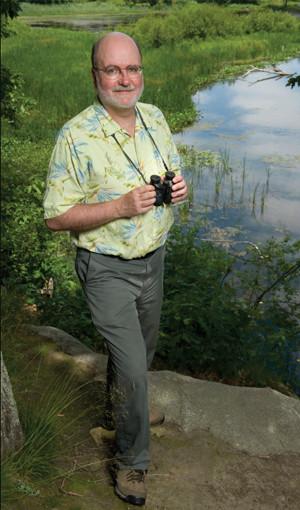Excellence in Teaching, 2010
Communication

Growing up in Brooklyn, N.Y., Lawrence Prelli thought there were three kinds of birds: sparrows, pigeons, and ducks. Now an avid bird-watcher, Prelli today has an academic’s perspective on his youthful misimpression. “What you see constrains your thoughts and influences your beliefs,” he says. “But at the same time, the language we use also shapes what we can think about, experience, and even perceive in the world around us.”
Much like birds, rhetoric—Prelli’s area of expertise—takes many forms. His Rhetorics of Display class has students traveling to Boston, where they visit places like the Holocaust Memorial, the Freedom Trail, and Kings Chapel Burial Ground.
“Students listen to the rangers talking about Faneuil Hall and come to realize it’s not just about imparting information, but that what they’re saying has persuasive implications,” Prelli says. “We come to understand these places are rhetorical sites that influence people’s attitudes.”
All manner of communication matters rhetorically. That is precisely what Prelli leads his students to understand when he shows them how to transform seemingly abstract analytical concepts into tangible critical practice—into not just the how but the why of rhetorical communication.
Students have been shaped by the way Prelli teaches. “He is worth every penny I pay back at the end of each month,” one recent graduate says. Another, a former doctoral candidate in the English department, says, “I can say without reservation that Professor Prelli is the person who has most significantly influenced my intellectual and professional development over the last 12 years.”
One of the ways he does that is by helping students learn the language of rhetoric. They come to understand the importance of recognizing that different vocabularies reflect different ways of thinking.
“By learning the language of rhetorical analysis, students see more clearly the variety of perspectives that exist, and the prospects for conflict or collaboration. As I became a bird-watcher, I learned a new vocabulary that enabled me to see with a more discerning eye. Now when I look at a sparrow, I don’t just see a brown bird.”
—Jody Record
About this Award
Each year, the University selects a small number of its outstanding faculty for special recognition of their achievements in teaching, scholarship, and service. Awards for Excellence in Teaching are given in each college and school, and University-wide awards recognize public service, research, teaching, and engagement.
